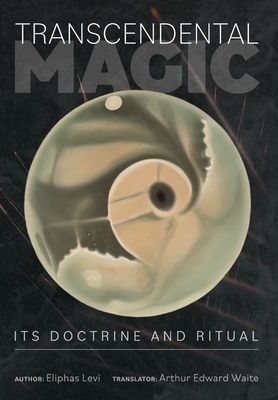Transcendental Magic: Its Doctrine and Ritual

Transcendental Magic: Its Doctrine and Ritual
Born Alphonse Louis Constant in 1810, this French occultist originally planned for a career in the Catholic Church. Constant was educated at Saint Sulpice's seminary, and planned to become a priest. Yet just before he was to receive his ordination at age 26, Constant renounced his ecclesiastical goals and returned to civilian life.
The following years tested Constant's conscience and resilience. He was disowned by his family, and worked as a tutor to earn an income. Without the structure from the seminary, he found himself adrift.
Constant dedicated much of his early life to promoting the ideals of a utopian socialist society that worked for the economic improvement of all people. He shared these ideas in an early work called The Bible of Liberty. Within an hour of its release, the copies were seized by French authorities, and Constant spent the next six months in prison.
After a failed marriage and the death of his young daughter, Constant discovered the world of the occult and mysticism. He became a ceremonial magician, and developed a social circle of many of the occultists and Kabbalists of the time. Writing on the subject under the Hebrew name Éliphas Lévi, he began to share his ideas on magic with the public in the 1850s.
Lévi's first published book on ritual magic is the two-part work, Transcendental Magic: Its Doctrines and Rituals. The two parts were first published as single work with a thorough biographical introduction in 1958.
This work explores the magician's foundations for his spiritual beliefs, as well as his idea that an elite class of priests would be necessary to lead the people into both social and magical order. He writes, "Occult philosophy seems to have been the nurse and godmother of all intellectual forces, the key of all divine obscurities, and the absolute mistress of society, in those ages when it was exclusively reserved for the education of priests and of kings...Magic is the traditional science of the secrets of Nature which comes to us from the Magi."
Part One, The Doctrine of Transcendental Magic, was first published in 1854. This work establishes the concepts behind symbols like the tetragram and pentagram, the significance of Hebrew letters and numbers, and the relationship between science, occultism, and formal religion. Lévi was the first to
PRP: 206.58 Lei
Acesta este Prețul Recomandat de Producător. Prețul de vânzare al produsului este afișat mai jos.
165.26Lei
165.26Lei
206.58 LeiLivrare in 2-4 saptamani
Descrierea produsului
Born Alphonse Louis Constant in 1810, this French occultist originally planned for a career in the Catholic Church. Constant was educated at Saint Sulpice's seminary, and planned to become a priest. Yet just before he was to receive his ordination at age 26, Constant renounced his ecclesiastical goals and returned to civilian life.
The following years tested Constant's conscience and resilience. He was disowned by his family, and worked as a tutor to earn an income. Without the structure from the seminary, he found himself adrift.
Constant dedicated much of his early life to promoting the ideals of a utopian socialist society that worked for the economic improvement of all people. He shared these ideas in an early work called The Bible of Liberty. Within an hour of its release, the copies were seized by French authorities, and Constant spent the next six months in prison.
After a failed marriage and the death of his young daughter, Constant discovered the world of the occult and mysticism. He became a ceremonial magician, and developed a social circle of many of the occultists and Kabbalists of the time. Writing on the subject under the Hebrew name Éliphas Lévi, he began to share his ideas on magic with the public in the 1850s.
Lévi's first published book on ritual magic is the two-part work, Transcendental Magic: Its Doctrines and Rituals. The two parts were first published as single work with a thorough biographical introduction in 1958.
This work explores the magician's foundations for his spiritual beliefs, as well as his idea that an elite class of priests would be necessary to lead the people into both social and magical order. He writes, "Occult philosophy seems to have been the nurse and godmother of all intellectual forces, the key of all divine obscurities, and the absolute mistress of society, in those ages when it was exclusively reserved for the education of priests and of kings...Magic is the traditional science of the secrets of Nature which comes to us from the Magi."
Part One, The Doctrine of Transcendental Magic, was first published in 1854. This work establishes the concepts behind symbols like the tetragram and pentagram, the significance of Hebrew letters and numbers, and the relationship between science, occultism, and formal religion. Lévi was the first to
Detaliile produsului









